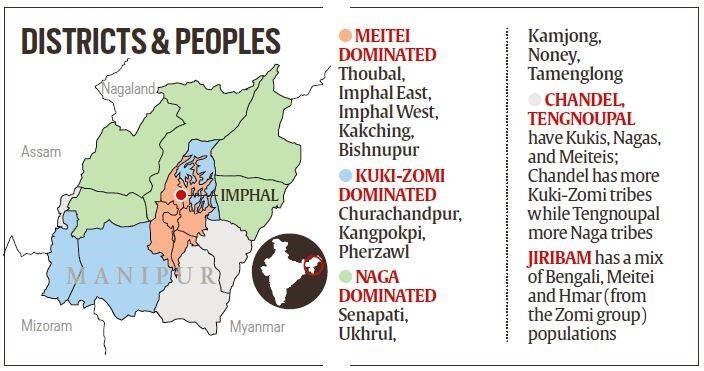In a detailed statement, the AKTC accused TIM of collaborating with fringe Meitei elements to delegitimize Kuki identity and warned that internal fractures are being exploited by external forces during a time of crisis.
BY PC Bureau
The Any Kuki Tribes Council (AKTC)—the apex representative body for all Kuki clans and sub-clans recognized under the Scheduled Tribes of Manipur—has denounced the recently formed Thadou Inpi Manipur (TIM) for what it described as “divisive actions” threatening the unity and identity of the Kuki people. The AKTC warned that such internal disruptions are being exploited by hostile elements amid the ongoing ethnic tensions in the state.
In a statement released on July 11, the AKTC accused TIM of working in tandem with fringe elements of the dominant Meitei community to advance a campaign to remove the Kuki identity from the list of Manipur’s indigenous peoples. The AKTC had until now chosen silence, stating that the organization and its views lacked the credibility to warrant a response. However, citing the growing intensity of TIM’s assertions, the Council said it was compelled to respond publicly.
Challenging the Claim: “We Are Not Kukis”
At the heart of the dispute is a controversial claim by the Thadou Inpi Manipur that members of the Thadou tribe are not Kukis, a declaration the AKTC categorically rejects.
READ: Mizoram Arms Haul: NIA Charges 5 in Bangladesh-Linked Plot
“Their declaration holds no water,” the AKTC said. “The Thadou tribe, recognized as one of Manipur’s Scheduled Tribes under the 1956 Manipur Language Modification Act, is intrinsically linked to the Kuki community. One cannot simply disavow their Kuki identity through mere declarations.”
The Council emphasized that the shared language, customs, and cultural traditions among the various Kuki clans—including Thadous—predate the formal naming of the Thadou tribe. It further noted that recognition of Thadou identity does not negate the collective heritage of the larger Kuki umbrella, under which over 30 clans and sub-clans coexist.
Historical and Legal Recognition of Kuki Identity
The AKTC pointed out that the revival of the ‘Any Kuki Tribes’ in 2003, under the Scheduled Castes & Scheduled Tribes Orders (Amendment) Act of 2002, was undertaken precisely to ensure representation of those Kuki clans that do not fall under the Thadou classification. This act provided formal structure and recognition for those who share the same linguistic and cultural matrix but were left outside the increasingly exclusive framework advocated by Thadou-centric organizations.
“The revival of the AKTC was a response to the inflexibility of Thadou proponents who refused a unified tribal identity encompassing all Kuki clans and sub-clans,” the statement read.
READ: he Mega Tribal Land Grab (2): How Adivasi Fight a Losing battle in Chhattisgarh
By attempting to redefine the Kuki identity through exclusionary narratives, TIM is, according to the AKTC, undermining both legal recognition and centuries of shared heritage. The Council warned that “blood ties and heritage cannot be erased by mere assertions.”
Accusations of Clannish Politics and External Collusion
The AKTC accused TIM not only of divisiveness but of harboring a clannish, ethnocentric ideology that seeks to impose Thadou identity on other Kuki clans. It warned that such attempts will only deepen fractures within the community and prevent the much-needed unity required in the face of external threats.
“TIM, far from being a legitimate representative body, has no creed, no credence, and no mandate of the Thadou tribe. Its only contribution thus far has been to divide and delegitimize,” the AKTC alleged.
Furthermore, the Council condemned TIM’s alleged collaboration with “fringe elements” in the Meitei community, claiming that internal divisions are being deliberately stoked and exploited to weaken the Kuki resistance during what it called “a campaign of total annihilation” against Kukis in Manipur.
Call for Unity Amid Existential Crisis
The press statement ended with an urgent call for Kuki unity, warning that internal discord is no longer a luxury the community can afford. With the Kuki population under what the AKTC describes as sustained assault—from targeted violence to administrative exclusion—the Council urged all tribal leaders to abandon divisive rhetoric and work towards reconciliation and cooperation.
“Our people in Manipur have reached a breaking point, exhausted by the relentless problems and threats they face. Let us, therefore, as one blood, as one family, come together and strive to work towards unity and cooperation among our people,” the statement said.
The statement comes amid a rapidly deteriorating ethnic situation in Manipur, where Kuki and Meitei groups have clashed violently over issues ranging from land rights and tribal status to demographic and cultural representation. The region has seen waves of displacement, destruction of property, and inter-community hostility, drawing concern from national and international observers.
Analysts say that intra-community fractures, like those between TIM and AKTC, risk weakening collective political bargaining power and undermining the resilience of vulnerable groups. Calls for unity, therefore, are not only symbolic but strategic in preserving what remains of Kuki agency in a volatile landscape.












